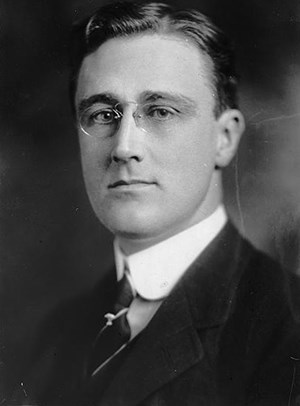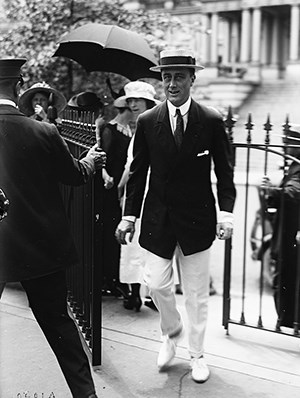Last updated: June 13, 2024
Article
Franklin Delano Roosevelt - Assistant Secretary of the Navy

Library of Congress LC-DIG-npcc-19466
On March 12, 1913, Franklin Delano Roosevelt, a two-term state senator in New York, received the nomination to become Woodrow Wilson’s Assistant Secretary of the Navy. Confirmed unanimously by the Senate, Roosevelt was just 31 years old, the youngest Assistant Secretary of the Navy. Previously, his fifth cousin Theodore Roosevelt had held the same post, and it was no accident another Roosevelt had been slotted into the same role.
While the Secretary of the Navy Josephus Daniels dealt with policy and Congressional matters, Franklin Roosevelt was left to deal with the business of personnel, operations, and contracting. Although he was an amateur in naval affairs, Roosevelt had the energy Daniels required to get things done. The relationship helped Roosevelt learn valuable lessons in politics that would only serve to help his career in the years ahead.
The war in Europe broke out in August 1914. Recognizing the historic moment, FDR wrote his wife Eleanor, “These are history-making days. It will be the greatest war in the world’s history.”
From the start, FDR worked to prepare the navy for a war he thought inevitable. Others did not believe the United States should be pulled into a war on faraway shores. Roosevelt was troubled that others did not see it his way. Wilson’s doctrine of neutrality blocked FDR’s ambition to ready the Navy. Wilson, like others, dismissed the idea that the United States would enter the war. Frustrated with the situation, FDR looked to chart a new course in his own political career, seeking an open senate seat in his home state of New York. In the end, FDR’s political ambition outpaced his experience, and he lost the election. Despite the political setback, Roosevelt kept his job as Assistant Secretary of the Navy. History would prove he was the right person for the job.

Harris & Ewing, courtesy of Library of Congress LC-H27- A-1030 [P&P]
Once at war, FDR set about stopping the U-boat menace, advocating for vast anti-submarine minefields in the North Sea. By February 1918, 100,000 mines were ready to be deployed. Although the war ended before the system could be fully tested, the minefield is thought to have destroyed at least four U-boats.
Cousin Theodore Roosevelt had urged FDR to get into uniform and join the war effort directly as Theodore's own children had done, but FDR was far too valuable to the Navy in his civilian position in Washington. In the summer of 1918, FDR went overseas to visit France, meet with French officials, and see the front for himself. At one point, he was within a mile of the German line, close enough to hear a German artillery shell pass overhead. The experience stayed with him the rest of his life. In 1936, FDR recalled his experience while defending his stance to keep America out of another European war:
On his return voyage on the USS Leviathan, many onboard were stricken with the Spanish influenza. Many died as a result. FDR was stricken with influenza and developed double pneumonia. His wife Eleanor met him when he arrived in the United States; he was too weak to walk unaided.“I have seen war. I have seen war on land and sea. I have seen blood running from the wounded. I have seen men coughing out their gassed lungs. I have seen the dead in the mud. I have seen cities destroyed. I have seen two hundred limping, exhausted men come out of line—the survivors of a regiment of one thousand that went forward forty-eight hours before. I have seen children starving. I have seen the agony of mothers and wives. I hate war.”
Although FDR’s job as Assistant Secretary of the Navy led him to advocate for readiness in anticipation of war, the shoe was on the other foot during his own presidency. As Europe marched to war again, President Roosevelt’s policy of isolationism resembled Wilson’s. And once again, the United States was not fully prepared for the war that came so suddenly. Nevertheless, FDR’s valuable experience managing the navy during WWI was an asset as America again marched to war in 1941.
